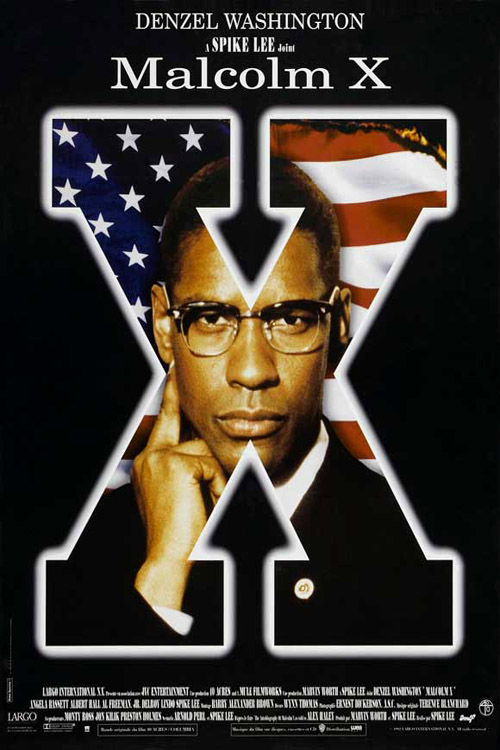Anthony's Film Review
Malcolm X (1992)

Spike Lee's take on a controversial figure in American history is simply honest and powerful...
Every high school and college class that teaches modern U.S. history will no doubt discuss Dr. Martin Luther King, Jr. and his pivotal role in the civil rights movement in the 1960s. If any of these classes have extra time, they may also talk about another African-American leader who is vocal on race relations: Malcolm X. In some cases, The Autobiography of Malcolm X, as told to Alex Haley, is a required reading assignment. If you've ever been in a class that compared Dr. King and Malcolm X, then you already know what the big deal is. Although these two men tackle the same issue, their attitudes and approaches are essentially polar opposites. You'll see what I mean in just a bit.
Let's talk about the movie Malcolm X, starring Denzel Washington in the title role and directed by Spike Lee. First off, I liked the opening credits sequence, because it is simple and yet effectively sets the tone for the whole movie and reminds us of its relevance in modern times. Basically, you see an American flag while hearing Malcolm X deliver a speech. The image alternates with video footage of Rodney King, a black man who was beaten by Los Angeles police officers (and whose trial resulted in a "not guilty" verdict that sparked riots in the city in 1992). Then the American flag burns so that the remnant is shaped like the letter X.
The movie goes right into Malcolm Little (his name before changing it to Malcolm X) as a young adult. It's mostly a series of positive scenes involving dialogue in a barber shop, dancing, and an affair with a white woman. Then Malcolm gets into hustling and other illicit activities. While this is happening, there are glimpses into Malcolm's past, including his years as a smart kid who was told that he couldn't be a lawyer because of his race and the struggles of his parents as they are threatened by the Ku Klux Klan. Though the beginning of the movie is important, I actually consider it to be my least favorite part but only because of the pacing.
In the second act, Malcolm goes to prison. He meets a fellow inmate who definitely stands out among the others because of his devotion to the religion of Islam. Malcolm slowly learns about becoming a Muslim, reads the entire English dictionary to further educate himself, and writes letters to Elijah Muhammad, the leader of the Nation of Islam. I like this part of the movie because of Malcolm's transformation. By the time he is freed from prison, Malcolm is a whole new man, far from the hustler he used to be.
The third and final act is really where the heart of the movie lies. It's also the longest portion, and that's perfectly fine. Malcolm leaves his mark on society in his final years, so this is the part I was waiting for. Basically, Malcolm starts out as a charismatic religious leader with a unique approach. He encourages members of the African-American community to join his organization, and he does this by telling them to stand up against white society. It's not yet the hate speech he later becomes infamous for. Rather, it's empowerment speech. He's giving other people strength, something they've never had before.
The problem, however, is that Malcolm maintains this perspective to the point where he is practically obsessed with it. Pretty soon, he has a habit of making speeches against the white man, even going as far as making insensitive comments about the assassination of President John F. Kennedy. It does disrupt his family life. By this time, Malcolm is married to Betty Shabazz, played by Angela Bassett, and have several children together. Malcolm is forced to confront the issue of his family's safety as he and his wife receive multiple death threats.
Denzel Washington is a pretty good choice for an actor to play the title character. Early on, the actor is easily recognizable, but as the movie progresses, he immerses himself in the role enough that, by the time the movie ends with video footage of the real Malcolm X, I couldn't tell the actor from the character. And you have to give Spike Lee a lot of credit, too. As a black filmmaker who is not afraid to tackle race-related issues in his movies, I could think of no better choice for director of this film.
Overall, the movie starts off good and gradually gets better. It certainly has what you'd expect in a epic biographical movie, particularly the generous length of time dedicated to exploring the major events of the subject's life. If there's one thing I wanted more of in this movie, it's in-depth emotion. I often consider biopics to be unique for its ability to capture the person's emotions, going beyond just the biographical facts. Here, the film is more heavy on facts than persona, but I'm not complaining. Spike Lee and Denzel Washington have managed to bring an important though controversial figure to the big screen in an honest way. Love him or hate him, this film will help you understand the life of Malcolm X.
Anthony's Rating:










For more information about Malcolm X, visit the Internet Movie Database.
Home
Film Reviews
Other Reviews
Commentaries
Links
About AFR
RSS Feed
Privacy Policy
E-mail Anthony











